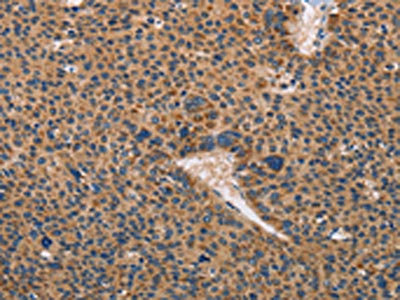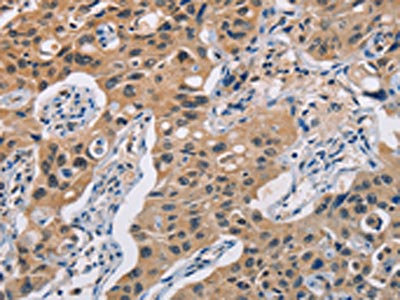TLR3 Antibody
-
中文名稱:TLR3兔多克隆抗體
-
貨號:CSB-PA218546
-
規(guī)格:¥1100
-
圖片:
-
The image on the left is immunohistochemistry of paraffin-embedded Human liver cancer tissue using CSB-PA218546(TLR3 Antibody) at dilution 1/50, on the right is treated with fusion protein. (Original magnification: ×200)
-
The image on the left is immunohistochemistry of paraffin-embedded Human lung cancer tissue using CSB-PA218546(TLR3 Antibody) at dilution 1/50, on the right is treated with fusion protein. (Original magnification: ×200)
-
Gel: 8%SDS-PAGE, Lysate: 40 μg, Lane 1-3: Hela cells, Raji cells, K562 cells, Primary antibody: CSB-PA218546(TLR3 Antibody) at dilution 1/500, Secondary antibody: Goat anti rabbit IgG at 1/8000 dilution, Exposure time: 20 seconds
-
-
其他:
產品詳情
-
Uniprot No.:
-
基因名:
-
別名:CD283 antibody; CD283 antigen antibody; IIAE2 antibody; TLR 3 antibody; Tlr3 antibody; TLR3_HUMAN antibody; Toll Like Receptor 3 antibody; Toll-like receptor 3 antibody
-
宿主:Rabbit
-
反應種屬:Human,Mouse
-
免疫原:Fusion protein of Human TLR3
-
免疫原種屬:Homo sapiens (Human)
-
標記方式:Non-conjugated
-
抗體亞型:IgG
-
純化方式:Antigen affinity purification
-
濃度:It differs from different batches. Please contact us to confirm it.
-
保存緩沖液:-20°C, pH7.4 PBS, 0.05% NaN3, 40% Glycerol
-
產品提供形式:Liquid
-
應用范圍:ELISA,WB,IHC
-
推薦稀釋比:
Application Recommended Dilution ELISA 1:2000-1:5000 WB 1:500-1:2000 IHC 1:50-1:200 -
Protocols:
-
儲存條件:Upon receipt, store at -20°C or -80°C. Avoid repeated freeze.
-
貨期:Basically, we can dispatch the products out in 1-3 working days after receiving your orders. Delivery time maybe differs from different purchasing way or location, please kindly consult your local distributors for specific delivery time.
相關產品
靶點詳情
-
功能:Key component of innate and adaptive immunity. TLRs (Toll-like receptors) control host immune response against pathogens through recognition of molecular patterns specific to microorganisms. TLR3 is a nucleotide-sensing TLR which is activated by double-stranded RNA, a sign of viral infection. Acts via the adapter TRIF/TICAM1, leading to NF-kappa-B activation, IRF3 nuclear translocation, cytokine secretion and the inflammatory response.
-
基因功能參考文獻:
- study reveals that upregulation of PGES via TLR3 is critical for BM-MSCs-mediated immunosuppression by PGE2 secretion via the COX-2/PGE2 pathway. PMID: 29273868
- We report a significant association between TLR3 L412F and persistent clinical disease in two cohorts of Irish and American Caucasians with pulmonary sarcoidosis. This study identifies defective TLR3 function as a previously unidentified factor in persistent clinical disease in pulmonary sarcoidosis and reveals TLR3 L412F as a candidate biomarker. PMID: 29237089
- Data indicate that trigeminal ganglion (TG) neurons are vulnerable to HSV-1 because they require preemptive stimulation of the Toll-like receptor 3 (TLR3) to induce antiviral immunity. PMID: 30154162
- These variations in the TLR3mediated signaling pathway molecules suggested that oxidative stress may be a key regulator for TLR3 activation during RSV infection PMID: 29845280
- In conclusion, we demonstrated that EV71 infection induced elevated expressions of TLR3/4 and Notch1/2 in CD14+ monocytes. PMID: 29702280
- Increased TLR3 expression in acute exacerbations of chronic obstructive pulmonary disease patients is associated with declining lung function PMID: 29264743
- Data show that regenerating family member 3 alpha protein (REG3A) can modulate specific cutaneous inflammatory responses and that the decrease in cutaneous REG3A exacerbates toll-like receptor 3 (TLR3)-mediated inflammation in diabetic skin wounds. PMID: 27830702
- These data indicate a novel role of the TLR3-TICAM-1 pathway in controlling miR-21 levels in extracellular vesicles. PMID: 29679565
- The TLR3.rs3775290 "CC" genotype was associated with hepatitis C virus chronicity, while the TLR9 gene may not play a major role in hepatitis C virus infection. PMID: 29860675
- CYLD inhibits post-transcriptional regulation of RIG-I and MDA5 expression following TLR3 activation in MCs. CYLD may be involved in the pathogenesis of CKD PMID: 29166644
- These results demonstrate that histamine up-regulates the expression of TLR3 and secretion of IL-13 and MCP-1 in mast cells, thus identifying a new mechanism for the histamine inducing allergic response. PMID: 29742501
- Reduced response of NK cells to TLR3 stimulation in children with recurrent infections has been observed. PMID: 29975469
- Using hepatocyte-based culture models for Hepatitis C virus (HCV) infection, we found a portion of HCV dsRNA intermediates to be released from infected cells in extracellular vesicles, which reduces activation of toll-like receptor 3. PMID: 29535029
- the association between TLR3, TLR4 variants and nine IL-6 polymorphisms, and response to anti-viral treatment during hepatitis C infection. PMID: 28823914
- results suggest that patients with Toll-like receptor 3 gene polymorphisms could be susceptible to periapical pathosis. PMID: 27031066
- The current study suggests that TLR3 signaling induces CCL5 expression via NF-kappaB and IRF3 in bile duct cells, and this pathway may be involved in the pathogenesis of BA. PMID: 29070776
- The down regulation of TRIF, TLR3, and mitochondrial antiviral signaling protein (MAVS) expressions in chronic hepatitis C correlates with the disease severity and the outcome of hepatitis C virus infection PMID: 28480979
- this study signifies that TLR3 adaptor molecules are necessary for the proper production of cytokines, chemokines and pro-labour mediators after TLR ligation PMID: 28844021
- we found that ORF3 protein downregulates TLR3-mediated NF-kappaB signaling via TRADD and RIP1. Our findings provide a new perspective on the cellular response in HEV infection and expand our understanding of the molecular mechanisms of Hepatitis E virus (HEV) pathogenesis in innate immunity. PMID: 27270888
- Increased expressions of TLR-3, TLR-4 and CD80 mRNA and the level of urinary CD80/creatinine could be useful markers to differentiate patients of steroid-sensitive nephrotic syndrome in relapse from those with steroid-resistant nephrotic syndrome. PMID: 28210837
- TRIM56 may act as a tumor suppressor in multiple myeloma through activation of TLR3/TRIF signaling pathway. PMID: 29214775
- p53 mutants that retain the ability to transactivate TLR3, can be used together with the TLR3 agonist polyinosinic-polycytidylic acid (poly(I:C) to alter immune responses mediated by this receptor, and subsequently increase TLR3-mediated apoptosis PMID: 27533082
- Positive rates of iNOS in cervical tissues were 72.1%, 28.2%, and 3.1% in the -HPV-positive patients with cervical cancer (CC group), HR-HPV group, and controls, respectively (P < 0.05). Levels of TLR3, TLR4, TLR7, TLR8, NF-kappaB p65, and iNOS in cervical epithelial cells were higher in CC group than in other groups. PMID: 28626766
- TLR signaling, in particular TLR3 activation, can efficiently reactivate HIV transcription in infected microglia, but not in monocytes or T cells PMID: 28166799
- TLR3 stimulation induces the Warburg effect in head and neck squamous carcinoma cells in vitro, and suggest that TLR3 may play a role in tumor adaptation to hypoxia. PMID: 27791989
- we report that autophagy is associated with apoptosis processes, involving LC3 and TRIF-colocation in human HCC cells. Regulation of autophagy and the TLR3-TRIF pathway may be effective in the treatment of liver cancer. PMID: 27338037
- Polymorphism of CD209 and TLR3 genes in populations of North Eurasia PMID: 29368829
- TLR3-activated signaling enhanced the therapeutic effects of human umbilical cord-derived mesenchymal stem cells in a mouse model of colitis PMID: 27649928
- the TLR3 Leu412Phe CC genotype is independently associated with severity of hepatitis C recurrence after LT. PMID: 27101936
- These data demonstrate that in the absence of HBsAg, hepatic hepatitis B virus replication leads to Tlr3-dependent interferon responses in non-parenchymal liver cells. PMID: 27121087
- Study found that the astrocytic TLR3-mediated cytokine expression profile is modulated by prostaglandin, and NF-kappaB, ERK1/2 and GSK-3beta are involved in the modulatory mechanism. These results suggest that pathological conditions with increased COX activity can neuroimmunologically alter neuron-glia interaction. PMID: 25014275
- Activation of TLR3 and TLR4 stimulated the expression of HIF-1 through NF-kappaB in oral squamous cell carcinoma PMID: 27191981
- The present study investigated the effects of vitamin D3 on the expression of TLR3, TLR7, and TLR9 in Systemic lupus erythematosus patients. PMID: 28544067
- TLR3 or TLR4 activation of mesenchymal stem cells increases Treg cell induction via the Notch pathway PMID: 27571579
- Data suggest that, unlike non-metastatic intestinal epithelial cells (IECs), metastatic IECs express TLR3 and that TLR3 agonists induce inflammatory cytokine (CXCL10) production and promote invasiveness of IECs. (TLR3 = toll-like receptor 3; CXCL10 = chemokine [C-X-C motif] ligand 10 protein) PMID: 28717003
- TLR3-activated macrophages release exosomes that contain anti-HCV microRNA (miRNA)-29 family member PMID: 27605546
- homozygous IFITM3 CC and TLR3 CC genotypes showed significant independent associations with higher death risks in H7N9/H1N1pdm09 influenza in a large Chinese cohort PMID: 28510725
- TLR3 activation can induce metabolic reprogramming in a pharyngeal cancer cell line, leading to increased aerobic glycolysis, cell migration, elevated levels of reactive oxidative species (ROS), and decreased anti-oxidative response. PMID: 27805282
- Ligand-driven triggering of TLR-3, -4, NOD2, and DC-SIGN, despite reducing viral replication, markedly increased the capacity of infected dendritic cells to stimulate HIV-specific cytotoxic T-cells. PMID: 28266028
- Since mumps virus SH coimmunoprecipitated with tumor necrosis factor receptor 1 (TNFR1), RIP1, and IRAK1, we hypothesize that SH exerts its NF-kappaB activation inhibitory function by interacting with TNFR1, interleukin-1 receptor type 1 (IL-1R1), and TLR3 complexes in the plasma membrane of infected cells. PMID: 28659487
- Primary tumor-derived exosomal RNAs, which are enriched in small nuclear RNAs, activate TLR3 in lung epithelial cells, consequently inducing chemokine secretion in the lung and promoting neutrophil recruitment. PMID: 27505671
- the L412F polymorphism in the TLR3 gene could be a genetic risk factor for the development of human cytomegalovirus disease PMID: 28046022
- Studied Toll-like receptor 3 (TLR3) mutations in a cohort of 11 adult Italian viral encephalitis patients. PMID: 28368532
- This study concluded that M. catarrhalis reduces antiviral defense functions of bronchial epithelial cells, which may increase susceptibility to viral infections. PMID: 26979086
- Report PD-1/PD-L1 and TLR3 expression in malignant pleural mesotheliomas as possible tests for selection patients who could benefit from immunotherapy. PMID: 26980049
- LUBAC components control TLR3-mediated innate immunity, thereby preventing development of immunodeficiency and autoinflammation. PMID: 27810922
- found that TLR3 signaling induces the expression of IFI35, and IFI35 negatively regulates IFN-beta-P-STAT1-RIG-I-CXCL10/CCL5 axis in U373MG cells. This suggests that IFI35 expressed in astrocytes may play an important role in regulating the innate immune system in astrocytoma cells. PMID: 28109979
- COPD lung tissue explants showed a greater pro-inflammatory response to TLR3 or TLR7/8 activation than control smokers. PMID: 27729782
- frequency of TLR3 c.1377 TT homozygous mutant genotype in the Crimean-Congo hemorrhagic fever (CCHF) patients was higher than that of the healthy controls in the clinical settings; in conclusion, presence of TLR3 c.1377 TT genotype may have a role in the susceptibility to CCHF PMID: 26959380
- TLR-3 c.1377 T-allele was associated with advanced stage of hepatic fibrosis in Egyptian patients. Frequency of polymorphic genotypes in TLR-3 (_7 C/A), TLR-3 (c.1377C/T) and TLR-9 (1237T/C) were not significantly different between studied HCV-positive patients and controls. PMID: 28093541
顯示更多
收起更多
-
相關疾病:Herpes simplex encephalitis 2 (HSE2)
-
亞細胞定位:Endoplasmic reticulum membrane; Single-pass type I membrane protein. Endosome membrane. Early endosome.
-
蛋白家族:Toll-like receptor family
-
組織特異性:Expressed at high level in placenta and pancreas. Also detected in CD11c+ immature dendritic cells. Only expressed in dendritic cells and not in other leukocytes, including monocyte precursors. TLR3 is the TLR that is expressed most strongly in the brain,
-
數(shù)據(jù)庫鏈接:
Most popular with customers
-
-
YWHAB Recombinant Monoclonal Antibody
Applications: ELISA, WB, IF, FC
Species Reactivity: Human, Mouse, Rat
-
Phospho-YAP1 (S127) Recombinant Monoclonal Antibody
Applications: ELISA, WB, IHC
Species Reactivity: Human
-
-
-
-
-























